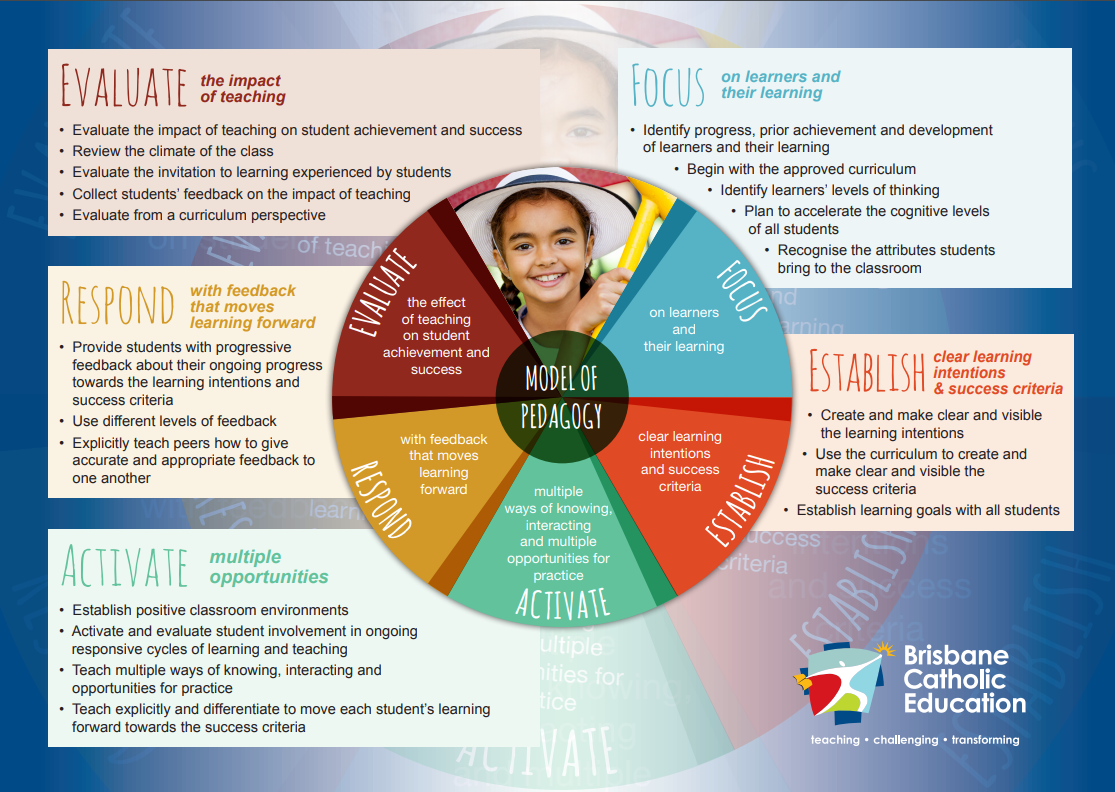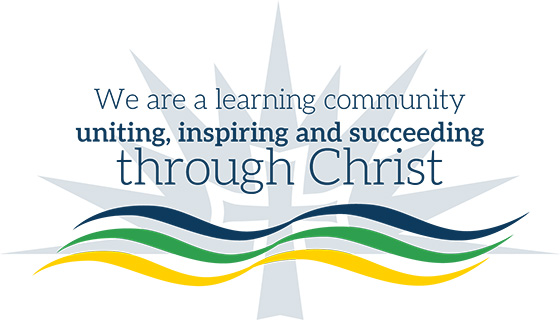Unity is a master-planned P-12 College made up of the Junior Phase of Learning - P-6, the Middle Phase of Learning Years 7-9 and the Senior Phase of Learning Years 10-12. The holistic development of the child in the Junior Years provides a strong foundation for success throughout life.
"Let the children come to me..." (Lk 18:16)
"That they may have life, life to the full..." (Jn 10:10)
A young child's sense of self and sense of God will be based on love, kindness, patience, dependability and trust, all of which are ideally modelled by parents/carers, teachers and members of our faith community.
At Unity, we expect:
- to provide flexible, supportive and encouraging learning environments,
- to design an inclusive curriculum which demonstrates continuity and connectedness as children make various transitions throughout their schooling.
The Unity College Vision for Learning and Teaching is intrinsically linked the College's Mission, Motto, Values and Pedagogical Practices. Learning in the Junior Phase is underpinned by our belief that all learners can be successful, and this is reflected in our Vision for Learning which articulates 10 core values or principles.
Creating Challenging Contexts
| Connected Elements
|
Engaging Cultures
| Holistic Education
|
Inclusive Practices
| Relational Approaches
|
Responsive Environments
| Student Centred Learning
|
Learning and teaching at Unity College is based on the Brisbane Catholic Education Model of Pedagogy which brings together the principles and practices of learning and teaching that lead to success for all learners. © Brisbane Catholic Education, Unity College (2024)
© Brisbane Catholic Education, Unity College (2024)
Early Years Education
Our Junior Phase incorporates the early years. The term Early Years refers to the years of schooling from Prep to Year 2. The Early Years of schooling is a crucial time for children. In the early years of schooling, children have a natural curiosity about their world and their desire to make sense of it provides a platform to construct and review their learning through interactions with others, experimentation, scaffolding, explicit teaching, practice and play in the classroom and beyond.
This helps them make sense of a world that is outside their immediate experience, as they connect new knowledge with what they already know or believe. This also provides an opportunity to challenge prior understanding and knowledge as they grow in their learning.
Unity College Early Years students are nurtured and supported by our Catholic and Uniting Church faiths, traditions and values, while they actively construct knowledge about their world.
The Early Years provides a foundation for successful, lifelong learning and participation in the Australian community.
- to celebrate their uniqueness,
- to develop social, emotional and behavioural well-being,
- to experience success in learning.
In the early years of schooling, priority at Unity College is given to literacy and numeracy development because these are the foundations on which further learning is built. The foundation for literacy is built primarily in English and the foundation for numeracy primarily in Mathematics.
However, both literacy and numeracy are reinforced and strengthened through learning in all other learning areas and contexts including Science, the Humanities and Religious Education.
Priority is also given to motor skills development, physical activity and the development of safe and healthy personal practices through the teaching of Health and Physical Education. Equally, all students in these early years will have the opportunity to develop their sensory, cognitive and affective appreciation of the world around them through exploratory and creative learning in the Arts and in Technologies.
5 Contexts of Learning
Teaching in the Early Years is characterised by a model of pedagogy referred to as the 5 Contexts for Learning which incorporates: Play, Real Life Situations., Routines and Transitions, Focussed learning and Teaching and Investigations.
- Play
In the early phase of schooling the purpose of play is to support children‛s learning and development. Play extends children's learning. Play occurs in both indoor and outdoor environments. It provides a powerful context in which children learn as they actively engage socially, emotionally, physically and intellectually with people, objects and representations.
- Real Life Situations
Real-life learning situations enable children to build connections between their home, community and classroom experiences. Real-life situations are particularly important as they provide opportunities for teachers to make explicit how, where and why people use spoken language, literacy and numeracy in their everyday lives.
- Routines and Transitions
Routines and transitions provide important opportunities for meaningful spontaneous and planned learning Children are able to be supported when gaining familiarity with classroom cultures and practices.
- Focused Learning and Teaching
In focused learning and teaching situations, children actively co-construct understandings through interacting with people, objects and representations. Whether planned, child or adult-initiated or occurring spontaneously, focused learning and teaching provides opportunities in which teachers purposefully and skillfully make learning explicit.
- Investigations
Investigations generally involve children interacting with people, objects and representations, as they inquire, explore relationships and test ideas. Investigations in the early phase of learning provides opportunities to explore ways to communicate; investigate social, natural and built environments; and experiment with artistic, scientific, technological and mathematical ideas and processes.
Australian Curriculum
At Unity College the Australian Curriculum is the source of all curriculum planning, assessment and reporting for all Learning Areas covered by the Australian Curriculum, as well as the Religious Education Curriculum of the Brisbane Catholic Archdiocese.
The Learning areas across the Junior Phase are:
• Religious Education
• English
• Mathematics
• Health and Physical Education (HPE)
• Science
• Humanities and Social Sciences – History and Geography
• The Arts [consisting of Music, Dance, Visual Arts, Drama and Media]
• Technologies (Digital Technology and Design & Technology)
• Cultural Literacy and Languages, including L.O.T.E – Japanese for Years 5 & 6
Assessment
At Unity College we use the Australian Curriculum Achievement Standards for making assessment judgements. As a community we are focussed on developing assessment capable learners who have the confidence and skills to demonstrate their knowledge, understanding and proficiencies across all learning areas and in real world situations, including assessment environments. Our aim is raising resilient and lifelong learners.
The process of assessment involves our teachers in:
- Providing students with varied opportunities to demonstrate what they know and can do in relation to the identified success criteria across all learning areas
- Gathering evidence and recording data of students' demonstrations in all learning area
- Making judgements about students' demonstrations in all learning areas.
Staff use a variety of assessment techniques and sources to gather evidence about students' demonstration of learning. These include:
- Observation
- Focused Analysis
- Periodic testing
- Consultation
- Self and peer assessment
- Feedback
Reporting
At Unity College we believe that reporting should focus on and about learning. As such, it has three main purposes…
- Effective Communication
- Improving Student Learning
- Accountability
Effective Communication
- By working in positive partnerships, where effective communication takes place, the College is able to provide parents / caregivers, teachers and the learners themselves with comprehensive, accurate, reliable and constructive information concerning the learner's academic and non-academic progress and achievements and ways forward.
Improved Student Learning
- Reporting when viewed in its holistic sense forms an integral part of the teaching and learning cycle.
- When reporting to parents and students we provide them with useful information about progress and what can be done to improve student learning.
- Within the Model of Pedagogy Reporting sits at the Respond stage: providing feedback that aims to move learning forward.
- When reporting to parents and students we provide them with useful information about student learning progress and advice/guidance about what can be done to improve student learning.
Accountability
- Reporting involves a professional judgement made on a body of evidence about a student's progress and achievement against the standards of the curriculum of each learning area. These indicate standards of typical development aligned with particular year levels. Reporting provides parents with a progress point along this framework as well as a statement of achievement that indicates whether progress is at the expected level, above or below it.
- Reporting to parents and the wider community about how the college is working towards improved student learning outcomes.
'Reporting is a process, not simply a format for a report card.' (Brisbane Catholic Education: Assessment and Reporting Practices) Consequently, reporting should be regular and aimed at improved learning outcomes.
- It is aimed at informing and identifying what the learner can do,
- It needs to be flexible and
- Recognise the partnership that exists between the learner, college and home.
Reporting at Unity College is made up of a number of practices that we have negotiated with our community and are applied regularly and routinely in a cyclic manner. At Unity College we draw from a range of reporting practices, both formal and informal, to build home-college partnerships as we strive to improve student learning. These practices include but are not limited to …
Informal
| Formal |
| Parental Involvement in class and school activities | Written Report Cards |
| Before and after school conversations | Conferences / Interviews |
| Notes between home and school | Student Learning Portfolios
|
| Telephone Calls | Class / Year Level Newsletters |
| Emails between home and school | Parent teacher Information Evenings |
Year Level Blogs
| Student Support Team Meetings |
| | Whole School Annual Reports |
| Open Days / Nights |
| | Ongoing Profiles |
| | Celebrations of Learning |
| | NAPLAN Results |
| | Assessment Calendars
|
Publications and Handbooks
Please click the below links to download our recent handbooks.
 Prep Information Booklet.pdf
Prep Information Booklet.pdf

© Brisbane Catholic Education, Unity College (2024)